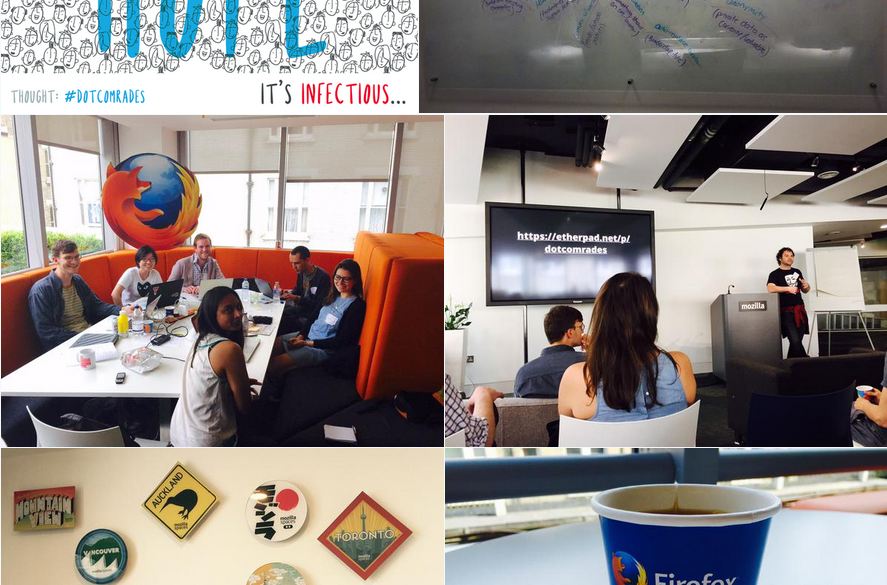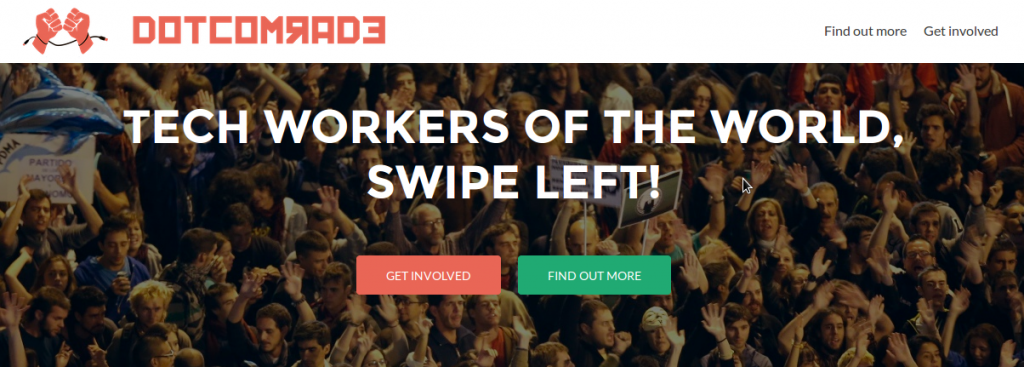This post is by Sue.
Last Friday (12 June 2015) I was delighted to attend the DotComrade hackday at Mozilla London. This event brought together techies, activists, union organisers and makers to hack organised labour. The diversity of people in the room was a productive mix, with prototype applications developed during the day.
Check out inaugural DotComrade John Bevan’s thoughts on the hackday.
DotComrade aims to reboot the labour movement, making tools that leverage technology to advance workers’ rights. Many of the projects people worked on last week focused on helping disenfranchised workers to organise and communicate. Of course technology, and in particular the open web, has the potential to revolutionise collective action, but it’s my feeling that open source practice can offer much more than tech to activism – I’d like to explore that here.
Open source software projects are developed by communities of people. These often large, diverse, globally networked groups unite around a common purpose. The organisations involved (for example Mozilla) are there – to a greater or lesser degree – to support the community’s work. The extent to which this is the case varies hugely from one project to another, but the key idea is a community acting collectively to serve a shared goal, with the responsible organisation providing an infrastructure in support of this effort.
These are not new ideas. From the labour movement to the civil rights movement, the notion of uniting often disparate groups of people on an issue or a desire for change is a tried and tested one. But for me it seems that the labour / trade union movements have lost their way, since they exclude many of the very people they were designed to support. The problem is not just that these movements have failed to use technology and the web effectively – they have also become entrenched in organising and management structures that are fundamentally exclusive, closed and ultimately alienating to the people who need them the most.
Openness offers a way forward
Open culture is about connecting to people and networks outside of your own. When we look at recent successful movements in workers’ activism, like the Fast Food campaign and Fight For 15, we see organising that is decentralised and open. Much of traditional activism, particularly in the trade union movement, expects participation in a small number of fixed ways, rather than supporting multiple types and routes of engagement, which is a tangible strength in the most effective open source communities.
The group I took part in at DotComrades asked: what are the practices in open source that can benefit activism? We came up with a rough design for an open template that could be used to begin any collaborative project, be it a campaign, a cooperative or even a new trade union.
Organising labour – some collaborative thinking from #dotcomrades pic.twitter.com/53179m7hKI
— Bryan Mathers (@BryanMMathers) June 12, 2015
We discussed what the elements in such a project might be – a model for collective decision-making, a policy structure and so on. By documenting this template openly, for example on a GitHub repo, anyone starting a new project could either use it out of the box or fork it, remixing its content to work in a particular context. Someone who has run a collaborative project and learned something problematic “the hard way”, could submit a “patch” to the template so that others benefit from what they have already learned.
Many of the successful movements in history have taken elements of other movements and remixed them in new contexts – this is open culture. The web gives us the ability to share learning and success between movements by openly documenting what we do and connecting to wider networks. By embracing open practice, we can build this remixability into our projects from the start, using accessible formats and structuring content in modular components others can pick and choose from.
Our belief with Hack Aye is that open ideology and the hacker ethic can extend participation in different areas of society to the diversity of people throughout the community. The trade unions certainly need a reboot, but I do feel that they still hold our best hope for the kind of social change that will deliver a more equal society – although they will only achieve that by supporting movements that stretch beyond their members (whose numbers are only going to continue to dwindle anyway).
Looking at the range and nature of emerging social movements, it really does feel like the web is changing activism in a powerful way. At the DotComrade hackday I met a load of creative people with a dynamic mix of skills and a real desire to use them to create change. This picture by Bryan Mathers says it better than I can (context – we had been talking about IndyRef):
BEWARE! A thought from @HackAye at #dotcomrades pic.twitter.com/xyckLTsXhD — Bryan Mathers (@BryanMMathers) June 12, 2015
Can’t wait to see what my fellow #dotcomrades do next.

